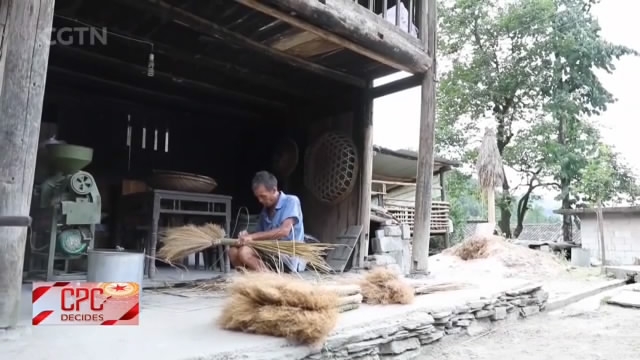
20:59, 22-Oct-2017
Poverty Reduction: Challenges emerge in efforts to relocate rural poor

China is resettling millions of its poorest citizens from remote regions in an effort to stamp out poverty. It's a large-scale relocation drive, but as our reporter Tao Yuan finds out, building houses for them in cities and towns is merely just the beginning. Challenges are starting to emerge and the major one is this: how to keep them there?
Yang Xiubing's goats are the few companions he has in Baiyun village. His wife and many of his neighbors have moved out of these remote mountains that he calls home. Yang decided to stay put, daunted by the high cost of living in towns and his lack of skills.
YANG XIUBING BAIYUN VILLAGE "I moved downhill for a few days and came back. I'm used to my life here. I'm too old for change."
Yang's concerns are slowing down a nationwide relocation plan aimed at lifting China's rural farmers out of poverty. His way of life shows why the drive is necessary. The mountainous Guizhou Province is one of the least developed. Abject poverty has driven most adults to the city in search for better jobs, and these are the ones left behind. But they now have a choice to move into town settlements, like this one, for free.
YANG YI, CHIEF OFFICE OF JIANGKOU COUNTY PARTY STANDING COMMITTEE GUIZHOU PROVINCE "Some of the terrain is too harsh to pave roads. Resettling the villagers makes more sense, because it's more convenient to build the necessary infrastructure and conduct job training."
Yang's wife Jin Qundi got everything she was promised: free housing, appliances, and a job as a gardener – one that pays better than her previous farming one.
JIN QUNDI YANG XIUBING'S WIFE "Everything is more convenient down here. Our living conditions used to be so bad in the past."
Jin is just one person in a massive migration movement. 2 million people all over the country are expected to be relocated from rural areas this year alone. If this plan succeeds, China will be one step closer to achieving its goal of eradicating poverty by 2020. But the challenge now is to convince them that this is a good idea.
JIN QUNDI YANG XIUBING'S WIFE "Everything costs money here, even flushing the toilet. I want to be able to keep our old house, to leave the option of moving back open."
YANG YI, CHIEF OFFICE OF JIANGKOU COUNTY PARTY STANDING COMMITTEE GUIZHOU PROVINCE "They know little about the outside world. They're scared out here. We repeatedly talk to them, and calculate their income with them. Eventually they understand that this is a good deal."
China is implementing poverty reduction programs in various ways, such as through animal husbandry, cash crop cultivation, education, tourism, technology and information facilitation. Relocation is merely only one of them, and also the last resort.
TAO YUAN JIANGKOU COUNTY, GUIZHOU PROVINCE "Life here is by no means fully modern, but it is a stark departure from rural farming. When their age-old ways collide with the inevitable trend of urbanization, the results, at least people's perception of them, are always good and bad. You can only hope that the benefits for the locals outweigh any pitfalls."
Soon, Jin will begin her new job harvesting these kiwis. She's excited about the future, but sometimes remains worried about what she left behind. As dusk falls, she makes her way to her old home deep into the mountains. The couple prepares a simple dinner, something they've done for decades. Yang may join his wife one day in town. But even if that happens, it'll be long before either one of them feels completely at home. TY, CGTN, Jiangkou County in Guizhou Province.

SITEMAP
Copyright © 2018 CGTN. Beijing ICP prepared NO.16065310-3
Copyright © 2018 CGTN. Beijing ICP prepared NO.16065310-3